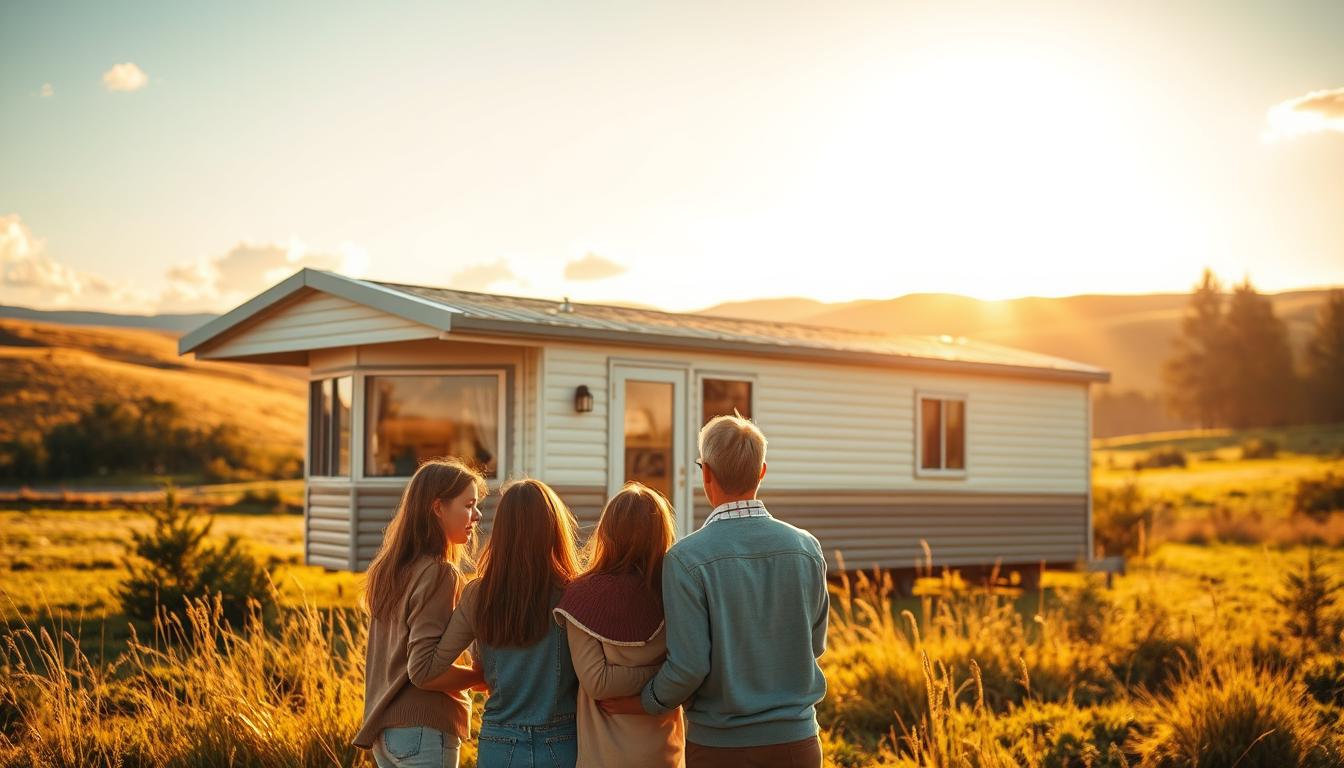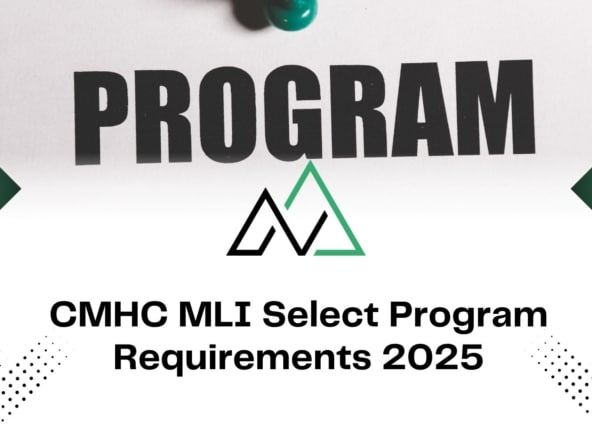Looking for the perfect manufactured home can change your life. At New Homes Alberta, we help you navigate the complex process of buying a mobile home in Canada. The mobile home market is full of affordable options, with 280 homes listed on Centris.ca as of July 2023.
Manufactured homes offer a new way to own a home. They are flexible and affordable, with prices from $15,700 to $279,900. The median price is about $160,000, making them a great choice compared to traditional houses.
Our guide covers everything you need to know about buying a manufactured home. We’ll talk about market trends and financial planning. Whether you’re buying your first home or investing in property, we’ll help you make the right choice.
Key Takeaways
- Mobile homes offer an affordable housing option in the Canadian real estate market
- Prices vary widely, with options to suit different budget ranges
- Manufactured housing provides flexibility and customization opportunities
- Understanding local regulations is key for a successful mobile home purchase
- Financial planning is essential for a successful mobile home investment
Understanding Mobile Home Evolution in Canada
The housing scene in Canada has changed a lot with the growth of manufactured homes. What started as simple, temporary homes has turned into high-quality prefab homes. These homes now match traditional houses in design and quality.
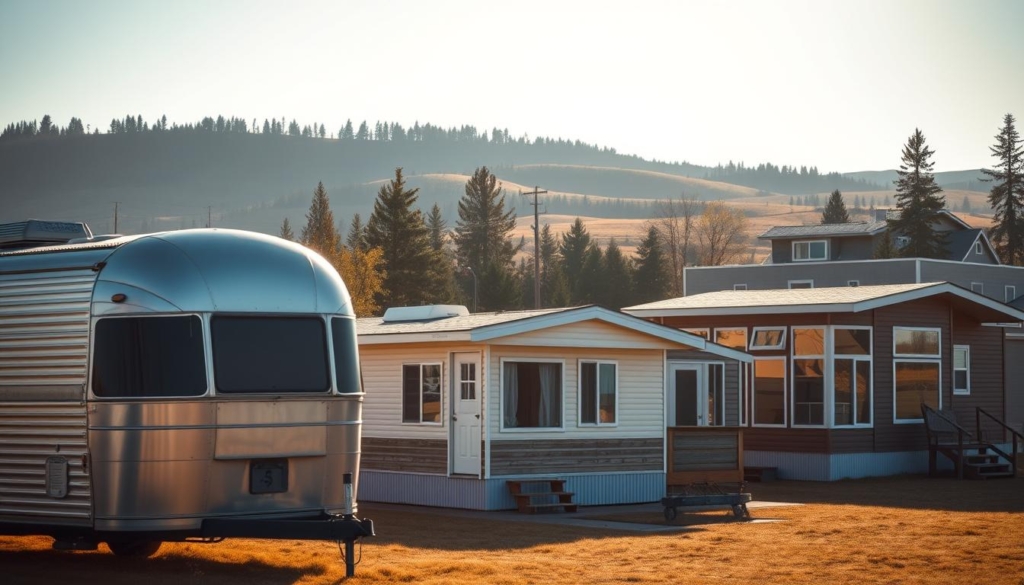
The history of mobile homes in Canada is filled with big changes. In the 1950s, homes were small, around 400 sq. ft. Now, they can be up to 1,700 sq. ft. and are very modern.
From Traditional Mobile Homes to Modern Manufactured Housing
Early mobile homes were quite different. They had:
- Limited square footage (400-576 sq. ft. in 1955-1965)
- Restricted mobility options
- Basic construction techniques
By the 1980s, things changed a lot. Homes got bigger and were built better. This was a big step forward for the industry.
Quality Standards and Construction Methods
Today’s manufactured homes use new, better ways to build. They have:
- Enhanced insulation (from R-12 to higher efficiency levels)
- Vinyl siding options
- Double-pane windows
- Customizable floor plans
In 1980, the industry changed its name to “manufactured home.” This showed how much better and more designed homes had become.
Current Market Trends
| Home Type | Average Cost | Size Range |
|---|---|---|
| Manufactured Homes | CAD 50,000 – 100,000 | 800 – 1,700 sq. ft. |
| Modular Homes | CAD 80,000 – 300,000 | 1,000 – 3,600 sq. ft. |
Today, prefab homes are affordable, flexible, and stylish. They keep getting better in quality. These homes offer Canadians a smart, cozy, and modern living option.
Types of Factory-Built Homes Available in Canada
The Canadian housing market has many options in manufactured housing. There are different prefab homes for various needs and budgets. It’s important for homebuyers to know these options for affordable and flexible housing.
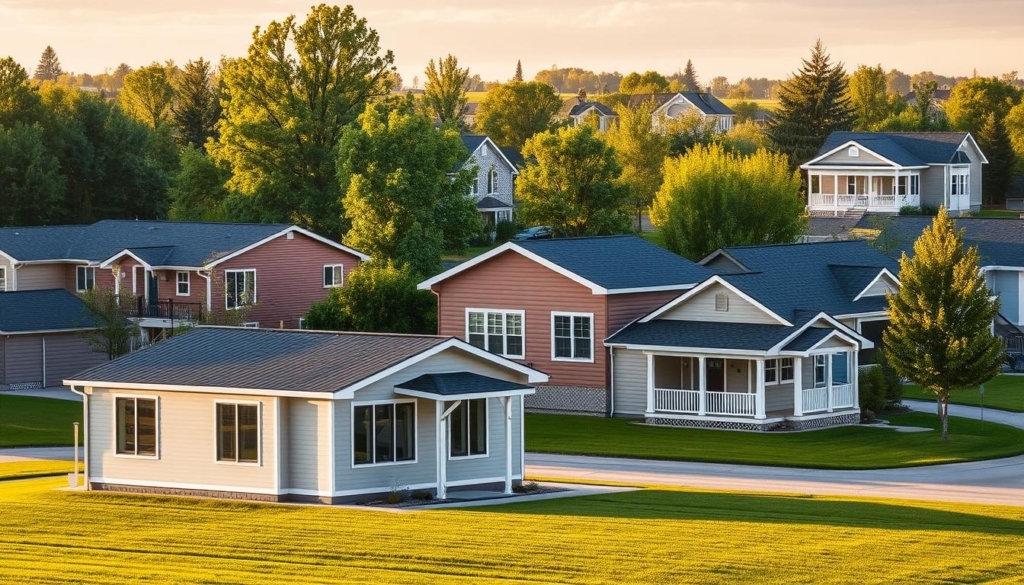
- Mobile Homes (Pre-1976)
- Manufactured Homes (1976-1998)
- Modern Modular Homes (Post-1998)
Each prefab home type has its own features and building standards. Mobile homes are the oldest type of factory-built housing. Manufactured and modular homes show big improvements in design, quality, and rules.
| Home Type | Construction Period | Key Characteristics |
|---|---|---|
| Mobile Homes | Before 1976 | Limited mobility, lower construction standards |
| Manufactured Homes | 1976-1998 | Improved construction, CSA Z240 MH standards |
| Modular Homes | Post-1998 | Highest quality, local building code compliance |
“The evolution of factory-built homes reflects Canada’s commitment to quality, affordability, and innovative housing solutions.”
Modern modular homes are the top choice in prefab housing. They offer the best construction and design flexibility. Built in controlled factories, they ensure quality and quick construction.
Benefits of Mobile Home Ownership
Looking into mobile home ownership shows it’s a great choice in Canada. It’s a budget-friendly option for those wanting affordable and flexible homes.
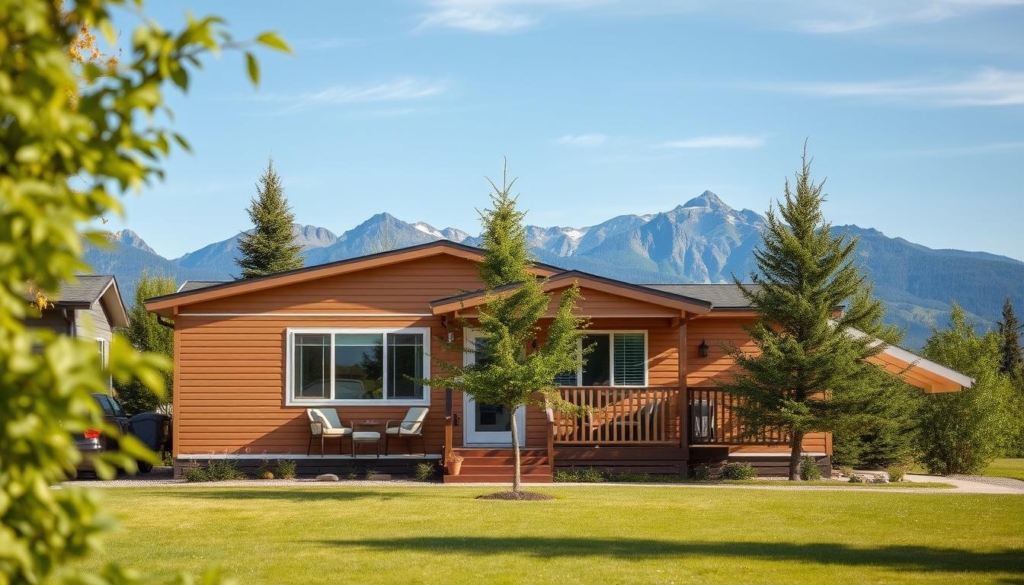
Cost-Effective Housing Solution
Mobile homes are very affordable for buying a home. Here are some key financial benefits:
- Purchase prices start as low as $150,000
- A 1,000-sq.-ft. mobile home averages around $200,000
- Compared to traditional homes in British Columbia (starting at $700,000)
“Mobile homes offer an economic entry point into real estate ownership that traditional markets cannot match.”
Flexibility and Customization Options
Used mobile homes are very adaptable for homeowners. Buyers can find units that:
- Can be quickly relocated
- Offer diverse design modifications
- Allow personalized interior upgrades
Community Living Benefits
Mobile home parks offer special living environments. Many developments offer shared amenities like:
- Swimming pools
- Fitness centers
- Community gathering spaces
- Age-restricted neighborhoods
With lower maintenance costs and reduced property taxes, mobile home ownership is a smart choice for budget-conscious Canadians. It offers quality living experiences.
How to Buy a Mobile Home: Step-by-Step Process
Buying a mobile home needs careful planning and strategic steps. It’s important to understand the process to make a successful purchase. Breaking it down into manageable steps makes the journey smoother.
- Financial Preparation
- Check your credit score (minimum 620 for most lenders)
- Calculate your budget using the 0.8% to 1% monthly payment rule
- Save for down payment (minimum 5% recommended)
- Research and Selection
- Determine home type (single-wide or double-wide)
- Compare prices (average single-wide: $86,400, double-wide: $158,600)
- Evaluate home quality and features
- Financing Options
- Explore government-backed loans (FHA, VA, USDA)
- Consider conventional and chattel loan programs
- Compare at least two lender offers
“Preparation is key when purchasing a mobile home. Know your financial limits and explore all available options.”
Critical documentation for your loan application includes:
- Last 2 years of W-2 forms
- 2 months of pay stubs
- 3 months of bank statements
Don’t forget to include extra costs like delivery fees ($700-$3,500), installation ($7,000-$47,000), and utility hookups ($1,000-$9,000) in your budget.
Financial Considerations and Budgeting
Getting a mobile home requires smart financial planning. You need to know all the costs involved. Buyers must look at more than just the price to make a good choice.
Down Payment Requirements
For mobile home loans, you’ll likely need to pay 5% to 20% down. Lenders check several things to decide how much you need to pay up front:
- Credit score stability
- Income verification
- Debt-to-income ratio
- Home purchase type (new or used)
Monthly Payment Calculations
It’s important to know what your monthly payments might be. Here’s a detailed look at what you might pay each month:
| Expense Category | Estimated Monthly Cost |
|---|---|
| Loan Payment (Principal & Interest) | $800 – $1,200 |
| Insurance | $50 – $100 |
| Property Tax/Registration | $50 – $150 |
| Park Fees/Lot Rent | $400 – $700 |
| Utilities | $150 – $250 |
| Maintenance | $50 – $100 |
Additional Costs to Consider
Mobile home financing isn’t just about monthly payments. You should also plan for extra costs:
- Installation costs for setting up the home
- Potential utility connection fees
- Transportation and setup expenses
- Emergency repair fund
Experts say it’s wise to save 3-6 months’ worth of housing costs. This helps keep your finances stable when getting a mobile home.
Mobile Home Financing Options in Canada
Looking into mobile home financing in Canada means knowing the many ways to get funding. The Canadian market has several paths to help you buy your manufactured home.
Key mobile home financing strategies include:
- Chattel loans specific to mobile homes
- Traditional mortgage options
- Personal loans
- Government-assisted financing programs
Financing a mobile home is different from buying a traditional house. Lenders need special documents and have their own rules. Credit scores are very important for loan terms and rates.
| Financing Type | Typical Down Payment | Interest Rate Range |
|---|---|---|
| Chattel Loans | 10-20% | 6.5% – 12% |
| Conventional Mortgages | 5-10% | 3.5% – 6.5% |
| Personal Loans | 0-10% | 8% – 15% |
Canadian homebuyers can use government programs for mobile home financing. The First Home Savings Account and provincial programs offer extra help for those who qualify.
When thinking about mobile home financing, buyers should:
- Check credit scores
- Save for a big down payment
- Look at different lenders
- Know all the costs of owning
People looking to buy a mobile home should think about their finances. They should also talk to experts to find the best financing for their situation.
Location Considerations and Land Lease Communities
Finding the right spot for your mobile home is key. It affects your comfort and investment. Land lease communities, or mobile home parks, offer affordable housing.
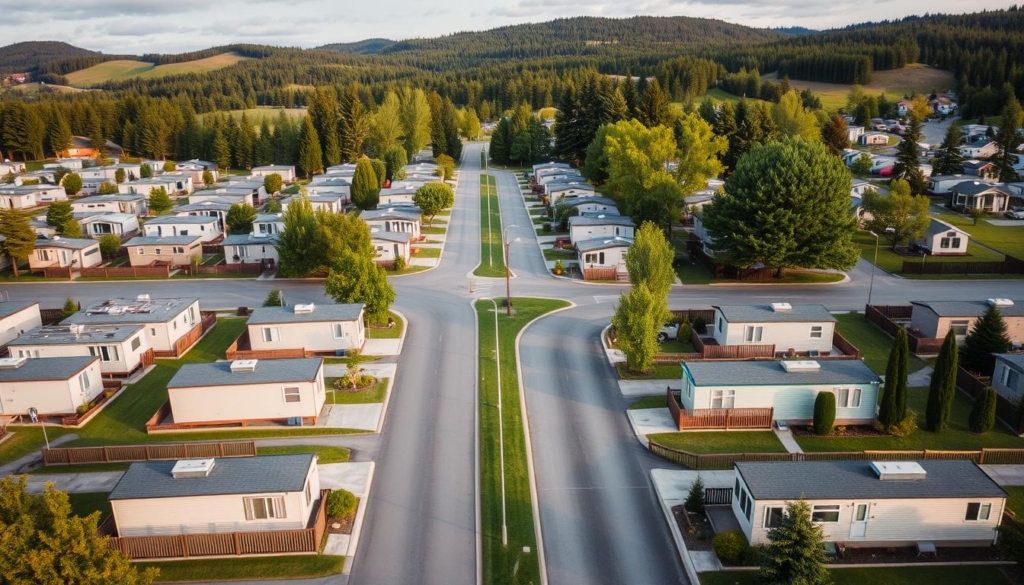
When looking at mobile home parks, think about a few important things:
- Proximity to essential services
- Community amenities
- Local infrastructure
- Neighborhood safety
Choosing the Right Community
Choosing a mobile home park needs careful thought. Look at these important points:
| Evaluation Criteria | Important Factors |
|---|---|
| Amenities | Swimming pools, clubhouses, fitness centers |
| Location Benefits | Proximity to schools, shopping, healthcare |
| Community Culture | Age demographics, social activities |
Understanding Lease Agreements
Lease agreements in mobile home parks are detailed. They cover:
- Monthly lot rental rates
- Utility responsibilities
- Maintenance expectations
- Community rules and restrictions
Land lease communities often have lower costs than traditional homes. In British Columbia, they’re regulated to protect homeowners.
Understanding lease agreements can save you money and stress.
By carefully looking at mobile home parks and lease terms, you can find a good fit. It should match your lifestyle and budget, providing a supportive home.
Important Inspection Points for Mobile Homes
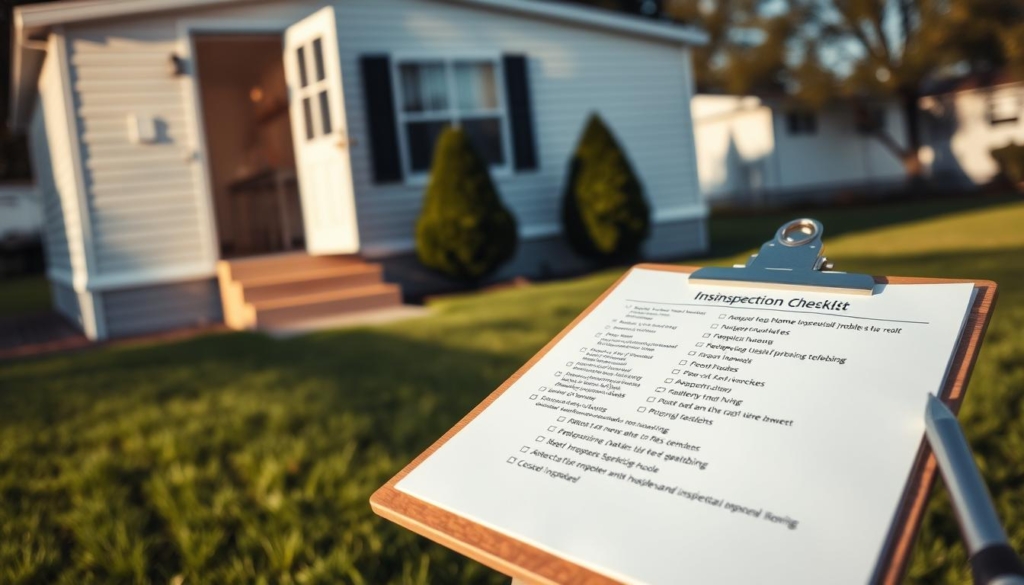
Buying used mobile homes needs a detailed check to ensure safety and value. With about 22 million people in Canada’s mobile home community, knowing key inspection points is vital for buyers.
A thorough check looks at many important areas to avoid expensive repairs later. Electrical systems are a big concern, as they cause about 13% of household fires.
- Foundation examination
- Structural integrity assessment
- Electrical system evaluation
- Plumbing and water damage check
- Roof and insulation inspection
When looking at used mobile homes, focus on key parts that affect long-term living and safety. The structure’s design greatly affects its durability, even in harsh weather.
| Inspection Area | Key Considerations |
|---|---|
| Foundation | Check for level positioning, concrete block stability, pier system condition |
| Electrical Systems | Verify wiring quality, panel box condition, grounding mechanisms |
| Water Damage | Inspect floors, walls, ceiling for moisture signs, possible mold growth |
| Structural Integrity | Examine wall alignment, floor stability, possible structural weaknesses |
Professional inspectors specialized in mobile homes can provide the most detailed evaluation. They know the unique challenges of manufactured housing and can spot issues that might not be obvious.
Remember, mobile homes built under Z-240 standards have specific rules. A detailed inspection is key to protect your investment and ensure a safe home.
Legal Requirements and Documentation
Understanding the legal side of manufactured housing in Canada is key. It protects your investment and keeps you in line with the law. Knowing these rules is essential.

When you buy a manufactured home, there are important legal things to know. The Canadian Standards Association (CSA) sets the standards for safety and quality. This is true for all manufactured homes in Canada.
CSA Certification Standards
Manufactured homes must pass strict tests to be safe and strong. The CSA makes sure of this. Here are some important parts of CSA certification:
- Homes built after June 1, 1998, must follow CSA A277 standards
- Older CSA Z240 standards are being replaced with better rules
- There are rules for inspections and keeping records
Provincial Regulations
Every province in Canada has its own rules for manufactured homes. These rules can affect your buying and owning experience.
| Province | Key Regulatory Considerations |
|---|---|
| British Columbia | The Manufactured Home Park Tenancy Act (MHPTA) protects tenants well |
| Alberta | There are specific laws about zoning and land use for manufactured homes |
| Ontario | There are strict rules about building codes |
Pro tip: Always check if a manufactured home has CSA certification. Also, look at the provincial rules before you buy.
“Understanding legal requirements is key to a smart manufactured housing investment.” – Canadian Real Estate Association
Insurance Requirements and Options
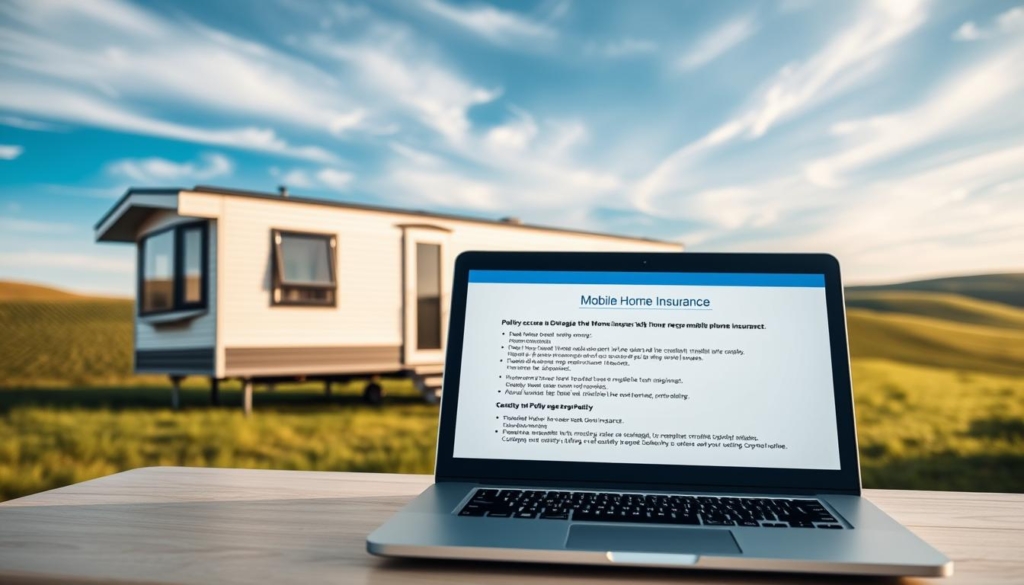
Getting the right insurance for your mobile home is key to protecting your investment. Mobile home insurance is designed to meet the unique needs of manufactured homes in Canada.
Understanding mobile home insurance involves looking at several important aspects of protection. Unlike regular homeowners insurance, mobile home policies cover specific risks of these homes.
- Dwelling coverage protects the physical structure
- Personal property protection safeguards your belongings
- Liability coverage shields you from legal expenses
Water damage is a big risk for mobile home owners. It can cause damages over $15,000 because of the complex construction. Insurers look at many factors to set mobile home insurance rates:
| Rating Factor | Impact on Insurance |
|---|---|
| Home Age | Older homes may have higher premiums |
| Location | Being close to emergency services affects rates |
| Construction Materials | It affects how insurable the home is |
There are optional mobile home insurance coverages for extra protection. These include:
- Earthquake coverage
- Protection for home-based businesses
- Glass breakage insurance
- Umbrella liability coverage
Many insurers have specific requirements for mobile home insurance. These include a permanent foundation, following building codes, and proper anchoring. Rates are often lower than standard homeowners insurance, making it a good choice for those watching their budget.
Pro tip: Always review your policy details carefully and discuss optional coverages with your insurance provider to ensure complete protection.
Mobile Home Transportation and Setup
Moving a mobile home is a complex task. It needs careful planning and precision. Professional movers are key to ensuring it’s done safely and correctly. Knowing the process can make homeowners feel more confident.
Relocating a mobile home requires careful preparation and the right tools. Movers must meet several important steps before they can start:
- Complete disconnection of all utilities
- Removal of external attachments like carports and decks
- Securing or removing loose exterior components
- Ensuring structural integrity of the home
Professional Moving Services
Choosing the right movers is essential. Not all transport companies have the expertise required for these specialized moves. Important things to consider include:
- Verification of transportation permits
- Assessment of home’s structural condition
- Use of appropriate transportation equipment like dollies
- Understanding regional transportation regulations
Site Preparation Requirements
Setting up a mobile home successfully needs good site preparation. Movers suggest:
- Creating a level pad with crushed gravel or concrete
- Ensuring minimum 15-foot clearance from overhead obstacles
- Installing proper blocking and support systems
- Preparing utility connections in advance
Choosing the right movers can make a big difference. It can turn a stressful move into a smooth one.
Maintenance and Upkeep Considerations
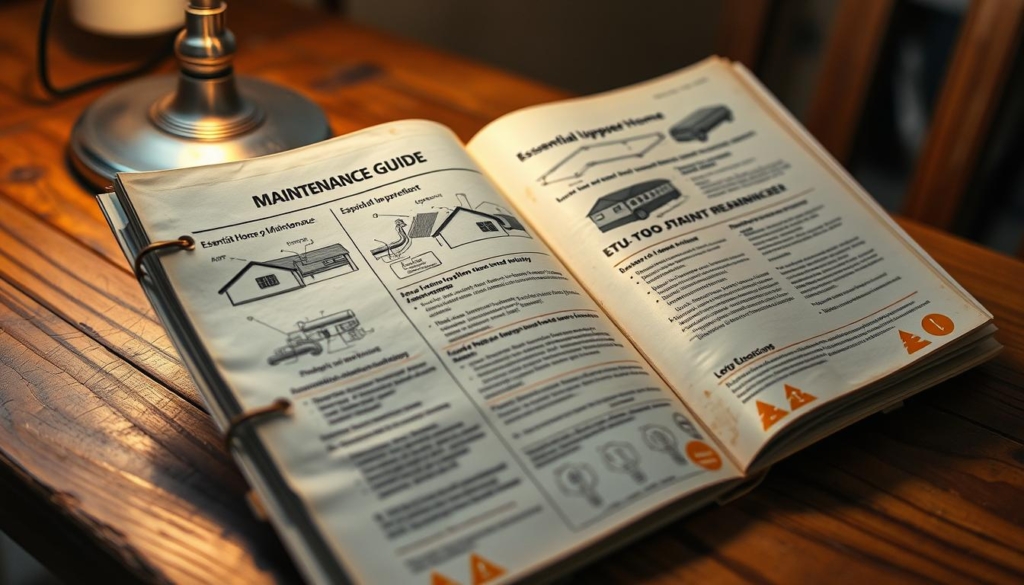
Keeping your mobile home in good shape is key to protecting your investment. Regular care helps avoid expensive fixes and keeps your home running smoothly for longer.
Effective mobile home maintenance means having a plan for upkeep. Homeowners should create a routine that covers both inside and outside needs.
- Foundation checks: Inspect for settling and possible imbalances every year
- Roof maintenance: Do annual recoating or resealing, more so on metal roofs
- Skirting care: Make sure there’s enough ventilation (1 square foot of venting per 150 square feet)
- Seasonal cleaning: Clean the exterior siding to stop mildew and mold
Protecting your home from the environment is also vital. HVAC systems need regular filter changes. Also, check caulking around windows and vents before winter to save on energy.
Preventive maintenance can save homeowners a lot of money in the long run.
Mobile home maintenance needs special attention to avoid costly repairs. Keeping your home level prevents structural problems like wall cracks and doors that don’t close right. Regular checks help spot issues early, saving you money.
With a solid maintenance plan, you can keep your mobile home in great shape. This protects your investment, keeps your home’s value up, and ensures a comfortable living space for years.
Common Structural Modifications and Additions
Manufactured housing lets homeowners make their homes their own. Prefab homes are great for adding new features. It’s important to plan well and follow the rules for these changes.
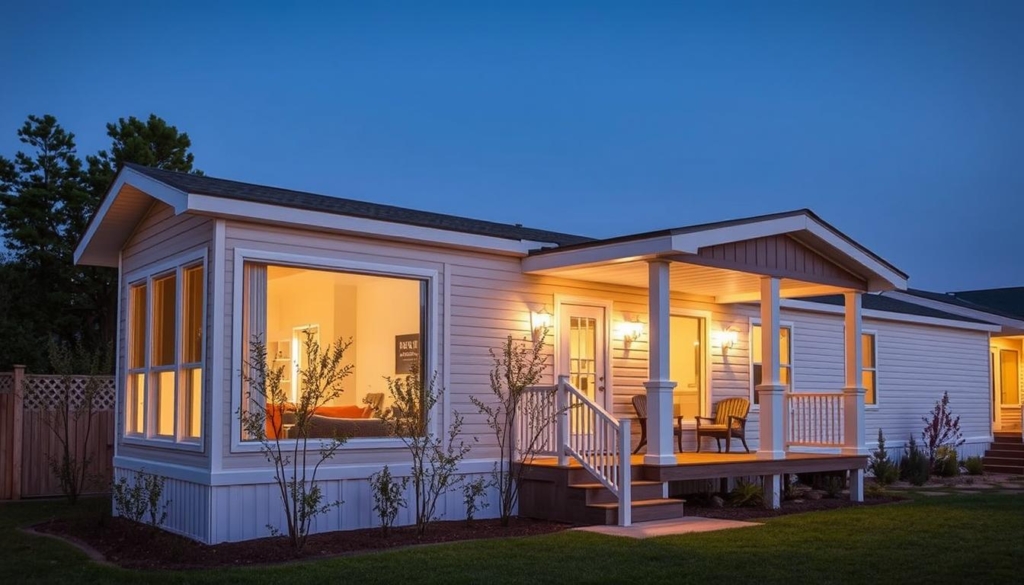
Before starting any renovation, homeowners need to think about a few things. These include safety, following rules, and keeping the home’s value up.
Permitted Renovations
Common changes to prefab homes include:
- Room extensions
- Enclosed porches
- Sunroom additions
- Second-story expansions
These changes can make your home bigger and might even increase its value. Experts say you should budget $10,000 to $50,000 for big additions.
Building Code Compliance
It’s important to follow building codes for home renovations. Key things to remember are:
- Getting the right local permits
- Making sure the structure is strong
- Using licensed installers
- Following local zoning rules
About 70% of homeowners have good results when they work with experts on mobile home changes.
Any additions must support themselves and meet engineering standards. It’s wise to get a pro to check the foundation and how much weight it can hold. About 30% of manufactured homes might need foundation work.
With careful planning and the right execution, homeowners can turn their prefab homes into unique spaces. These changes can meet their needs while keeping the home safe and valuable.
Working with Mobile Home Dealers

Finding the right dealer is key when buying a mobile home. The dealer you choose can greatly affect your buying experience and how happy you’ll be with your new home.
When looking for a mobile home dealer, keep these important points in mind:
- Dealer reputation and years of experience
- Range of mobile home models available
- Financing assistance options
- Customer support and after-sales service
It’s also important to ask the right questions to dealers:
- Are all homes CSA certified?
- What financing options do you offer?
- Can you provide references from previous customers?
- What warranties are included with the mobile home?
Knowing what dealers offer is vital. Good dealers provide a lot of help, including:
| Service Category | Typical Dealer Offerings |
|---|---|
| Customization | Floor plan modifications, interior design choices |
| Financing | Mortgage guidance, loan application assistance |
| Transportation | Professional moving and site setup services |
| Documentation | Help with registration, permits, and legal requirements |
Pro tip: Always verify the dealer’s credentials with local mobile home associations and read customer reviews before making a final decision.
A reliable dealer will be open about all parts of buying a mobile home. They will help you make a choice that fits your needs and budget.
Government Programs and Incentives
Getting a mobile home can be easier with government help. These programs aim to make buying a home less expensive for Canadians.
The Canadian government has several programs to help with mobile home purchases:
- First Home Savings Account (FHSA): Allows tax-free savings up to $40,000 for home purchases
- Home Buyers’ Plan (HBP): Permits tax-free RRSP withdrawal of $35,000 for first-time buyers
- First-Time Home Buyer Incentive: Provides 5-10% support for home purchases
There are also financial benefits:
- Tax credits up to $1,500 through the Home Buyers’ Amount
- GST/HST new housing rebate of up to $6,300
- Potential land transfer tax rebates ranging from $4,000 to $4,475
To qualify for mobile home financing, you need to:
- Have an annual income below $120,000
- Be a first-time homebuyer
- Keep your total debt under 44% of your monthly income
Each program has its own rules and limits. Buyers should look into these carefully. It’s also wise to talk to financial advisors to get the most out of these incentives.
Final Thoughts on Buying Mobile Homes in Canada
Buying a mobile home is an exciting journey to affordable and flexible housing. It involves checking your finances, understanding the market, and picking a home that fits your lifestyle. Modern manufactured homes are a great choice for Canadian buyers looking for cost-effective housing.
Buying a mobile home needs careful planning and smart decisions. Think about location, financing, community rules, and upkeep. New Homes Alberta suggests working with experts who know the Canadian mobile home market well.
Mobile home ownership offers chances for customization and saving money. Do your homework, know the laws, and work with trusted dealers like New Homes Alberta. For help and advice, call our team at (403) 305-9167. Let’s make your housing dreams come true.


